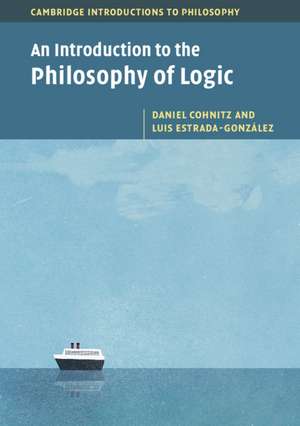An Introduction to the Philosophy of Logic: Cambridge Introductions to Philosophy
Autor Daniel Cohnitz, Luis Estrada-Gonzálezen Limba Engleză Paperback – 15 mai 2019
| Toate formatele și edițiile | Preț | Express |
|---|---|---|
| Paperback (1) | 240.63 lei 6-8 săpt. | |
| Cambridge University Press – 15 mai 2019 | 240.63 lei 6-8 săpt. | |
| Hardback (1) | 447.75 lei 6-8 săpt. | |
| Cambridge University Press – 15 mai 2019 | 447.75 lei 6-8 săpt. |
Din seria Cambridge Introductions to Philosophy
-
 Preț: 259.62 lei
Preț: 259.62 lei -
 Preț: 155.13 lei
Preț: 155.13 lei -
 Preț: 194.81 lei
Preț: 194.81 lei -
 Preț: 285.93 lei
Preț: 285.93 lei -
 Preț: 234.36 lei
Preț: 234.36 lei -
 Preț: 192.86 lei
Preț: 192.86 lei -
 Preț: 199.01 lei
Preț: 199.01 lei -
 Preț: 216.84 lei
Preț: 216.84 lei -
 Preț: 217.33 lei
Preț: 217.33 lei -
 Preț: 193.16 lei
Preț: 193.16 lei -
 Preț: 288.08 lei
Preț: 288.08 lei -
 Preț: 265.70 lei
Preț: 265.70 lei -
 Preț: 283.03 lei
Preț: 283.03 lei -
 Preț: 301.35 lei
Preț: 301.35 lei -
 Preț: 351.53 lei
Preț: 351.53 lei -
 Preț: 290.76 lei
Preț: 290.76 lei -
 Preț: 278.72 lei
Preț: 278.72 lei -
 Preț: 196.22 lei
Preț: 196.22 lei -
 Preț: 339.96 lei
Preț: 339.96 lei -
 Preț: 301.86 lei
Preț: 301.86 lei -
 Preț: 327.41 lei
Preț: 327.41 lei -
 Preț: 263.30 lei
Preț: 263.30 lei -
 Preț: 254.59 lei
Preț: 254.59 lei -
 Preț: 318.06 lei
Preț: 318.06 lei - 11%
 Preț: 622.06 lei
Preț: 622.06 lei -
 Preț: 304.74 lei
Preț: 304.74 lei
Preț: 240.63 lei
Nou
Puncte Express: 361
Preț estimativ în valută:
46.05€ • 49.24$ • 38.39£
46.05€ • 49.24$ • 38.39£
Carte tipărită la comandă
Livrare economică 18 aprilie-02 mai
Preluare comenzi: 021 569.72.76
Specificații
ISBN-13: 9781107527720
ISBN-10: 1107527724
Pagini: 272
Ilustrații: 5 b/w illus. 6 tables
Dimensiuni: 173 x 245 x 16 mm
Greutate: 0.5 kg
Editura: Cambridge University Press
Colecția Cambridge University Press
Seria Cambridge Introductions to Philosophy
Locul publicării:New York, United States
ISBN-10: 1107527724
Pagini: 272
Ilustrații: 5 b/w illus. 6 tables
Dimensiuni: 173 x 245 x 16 mm
Greutate: 0.5 kg
Editura: Cambridge University Press
Colecția Cambridge University Press
Seria Cambridge Introductions to Philosophy
Locul publicării:New York, United States
Cuprins
Introduction; 1. The nature and tools of logic; 2. The standard story and its rivals; 3. Is second-order logic proper logic?; 4. Logical constants; 5. The metaphysics of logic; 6. The epistemology of logic; 7. Logical pluralism; 8. Logic, reasoning, and rationality; 9. Beyond truth-preservation; 10. The place of logic in science.
Recenzii
'It is about the developments in the field of the philosophy of logic that are characteristic of our contemporary discourse. Accordingly, not only the relevant works of such classics as Frege, Tarski or Quine appear in the volume as reference sources, but also newer text contributions from the last ten to fifteen years in particular. This alone is gratifying and welcome. Everyday academic practice shows that the students' interest in questions that go beyond a mere introduction to logic as such remains undiminished … How, if anything, are logic, psychology and language related? Is there such a thing as 'logical facts'; and if so, how can we learn from them? Is logical knowledge basically a priori; and if so, how is it that certain logical systems can be modified or even rejected? If you are looking for information on questions of this kind, you are well advised to read this introduction.' translated from Zeitschrift für philosophische Forschung
Notă biografică
Descriere
Offers the first comprehensive textbook covering the interrelations between topics in the philosophy of logic in an accessible, non-technical, and up-to-date way.
